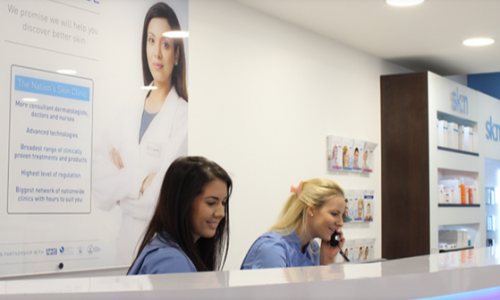Ocular Rosacea – What Is It?

Rosacea is an ongoing, incurable chronic skin condition that causes your face to flush red. It can also come out in acne-like spots on your forehead, cheek, nose, and chin. Ocular Rosacea is the fourth subtype of rosacea that affects the eye area.
Rosacea around the eyes often comes with symptoms of the other subtypes of rosacea, but understanding ocular rosacea can help you find the best treatment. We have outlined the symptoms, signs, and treatments for this condition here to help you decide your next steps.
Symptoms Of Ocular Rosacea
The signs and symptoms of ocular rosacea can develop before other signs of rosacea appear, occur together, or develop independently. This subtype is common in people with pre-existing skin rosacea, but you can develop ocular rosacea without any other parts of your skin being affected.
Skin rosacea usually affects more women than men, but ocular rosacea affects men and women equally. All kinds of rosacea are more common in fair-skinned people and those between 30 and 50 years of age.
You can have multiple forms of rosacea; and the symptoms can vary widely, with some types having dominance over others.
Symptoms of ocular rosacea may include:
- Feeling like there is dust or dirt in the eyes
- Red and swollen eyelids
- Red, burning, itching, or watery eyes
- Dry eyes
- Irritated and bloodshot eyes
- Blurred vision
- Inflammation of the eyelids (blepharitis)
- Sensitivity to light
Blepharitis is the inflammation of the eyelids commonly occurring when glands near the eyelashes become clogged.
Ocular rosacea may affect the cornea of the eyeball, especially if you have dry eyes, causing the cornea to become inflamed and damaged. This could potentially make the cornea vulnerable to infections that could threaten eyesight.
Causes Of Ocular Rosacea
The exact cause of ocular rosacea, as with skin rosacea, is still unknown, though it is thought it may be due to one or more of the following factors:
- Environmental factors
- Bacteria
- Blocked eyelid glands
- Eyelash mites
- Genetics
Your environment or habits can also trigger a flare-up of ocular rosacea; these include:
- Hot or spicy foods
- Alcohol and caffeine
- Dairy products
- Temperature extremes
- Aerobic or strenuous exercise
- Saunas or hot baths
- Emotions such as stress
Diagnosing Ocular Rosacea
It is essential to seek a professional if you develop ocular rosacea to avoid potential vision issues or loss. There aren’t specific tests or procedures to diagnose ocular rosacea, instead, your doctor or nurse will make a diagnosis based on your symptoms and an examination of your eyes, eyelids, and the skin on your face.
Ocular rosacea is often undiagnosed in those who don’t have skin problems associated with rosacea, but the two conditions don’t always come together. If you have skin rosacea, it’s important to get regular eye exams as these two conditions often go hand-in-hand.
Treating Ocular Rosacea
Rosacea isn’t curable, but you can control the symptoms through treatments. It’s important to decipher what symptoms of rosacea you have in order to choose your treatment effectively. You can read our blog dedicated to the different types of rosacea and their corresponding treatments to learn more.
Sk:n clinics provide expert treatments that can help persistent redness and work to visibly reduce the signs of this condition. The best rosacea treatment will depend on your particular variations of symptoms. We offer the following methods of rosacea treatment:
- Laser Treatment
For patients with visible blood vessels, laser treatment can be used to shrink them. This treatment uses brief pulses of light energy that target only the blood vessel, leaving the surrounding skin unharmed.
- Skin Peels
Skin peels help rosacea by exfoliating the top layers of skin, speeding up skin renewal and cell turnover, whilst preventing pores from becoming clogged with dead skin cells, which can aggravate rosacea. They can also help to reduce inflammation and promote skin healing.
- Medication
There is a range of oral and topical medications available, and these are capable of treating the redness, pimples, and bumps associated with rosacea. Such treatments are usually prescribed to gain immediate control over the condition, and subsequent long-term use of topical therapy is advised to maintain remission.
- Skincare Products
A gentle skin care routine can be invaluable in helping to control rosacea. In general, non-irritating skin care products are advisable, and protection from sun exposure by using a solid sunscreen also helps. Your practitioner can create a product pack unique to your concerns.
Other treatments for ocular rosacea include over the counter eye drops to prevent dry eyes, but be careful to avoid eye drops that have been formulated to clear up red-eye, as these products can worsen your symptoms. Scented, oil-based, and alcohol-based products can often aggravate the condition.
Key Takeaways
- Ocular rosacea is a long-term, chronic condition that mainly affects the eyes or eye area. It is incurable, but it can be significantly managed.
- Identifying which symptoms of rosacea you suffer from can help you choose the right treatment.
- Understanding your triggers and genetic predispositions can help you reduce a further outbreak.
- If left untreated, ocular rosacea can affect the cornea of the eyeball, causing the cornea to become inflamed and damaged. This may lead to infections that could threaten eyesight.
- Eye drops and ocular rosacea treatments can help control the symptoms and lessen irritations.
Need Help?
Find your nearest clinic and arrange a consultation with one of our dermatologists for advice on how to manage redness and rosacea.
Related Articles

08
Apr 2024

08
Apr 2024
Request a callback
One of our friendly sk:n advisors will call you to book your consultation.
- More than 450 consultants, doctors, nurses and medical practitioners
- Regulated by the Care Quality Commission, Health Inspectorate Wales and Health Improvement Scotland
- Partner of the NHS
- Rated excellent by our clients on Trustpilot
- Strict safety and care protocols




